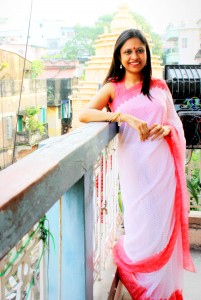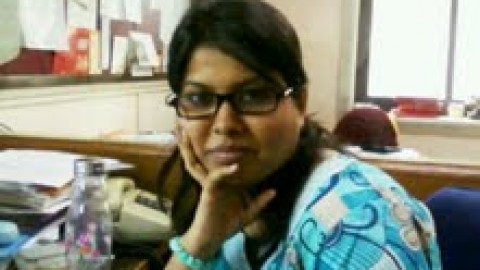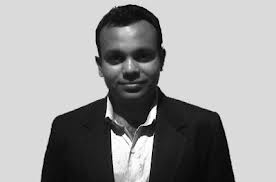A former student of the prestigious institutes like IIT Kharagpur and Jadavpur University, she represents the GenY women. With an experience of what real world is all about, she never thinks twice to express her opinions freely.
Yes! We are talking about Poulomi Sengupta, a geologist by profession who has an affinity towards oil painting, course writing and kickboxing. And, in a candid interview with Spectralhues, Poulomi unfolds the backstory of about her dreams, her book, and her journey till now.
Congratulations Poulomi for your new book “The Last Bloom”. Please tell us about the book.
Thank you very much!
The novel is a love story.
Not very contemporary though- because it takes on the present condition of colleges, education system and how an average middle class student stumbles through the various ups and downs during commencement of the adult life.
It is a coming of age story- of a young girl.
While a female perspective is given, the male counterpart is equally strong and vocal.
Are you satisfied with the kind of responses you are receiving for the book?
Pleasantly surprised with the reviews and the responses.
I had not expected great reviews because this is my first novel and because I have written about some unpalatable truths of the system, which requires transformation. The love story is unconventional.
It seems that the new generation of readers are mature and look forward to stories amalgamating practical realities of life.
How much research do you do?
Writing such a novel requires a bit of research. I did my research for 4 years.
Among the important papers and works that I had read are:
- Abolition of English at Primary Level in West Bengal by Poromesh Acharya.
- Life and Experiences of a Bengali Chemist by Acharya Prafulla Chandra Ray.
- The significance of Naxalbari: accounts of personal involvement and politics in West Bengal by Henrike Donner.
Describe the moment when you laid your hands on the first copy…
I had sent the novel manuscript to 10 publishers. I felt that no one may agree to publish it because the storyline is not conventional.
I have been rejected by 9 publishers and Leadstart is the 10th one- to accept the novel.
I am glad that Leadstart considered it worthy and the Head, Malini Nair believed in the storyline and that it could create an impact on the audience of the country.
In fact, the first time I went to Crosswords to see the novel in the racks was exhilarating!
How do you market your books? Any tips on what to do and what not to do?
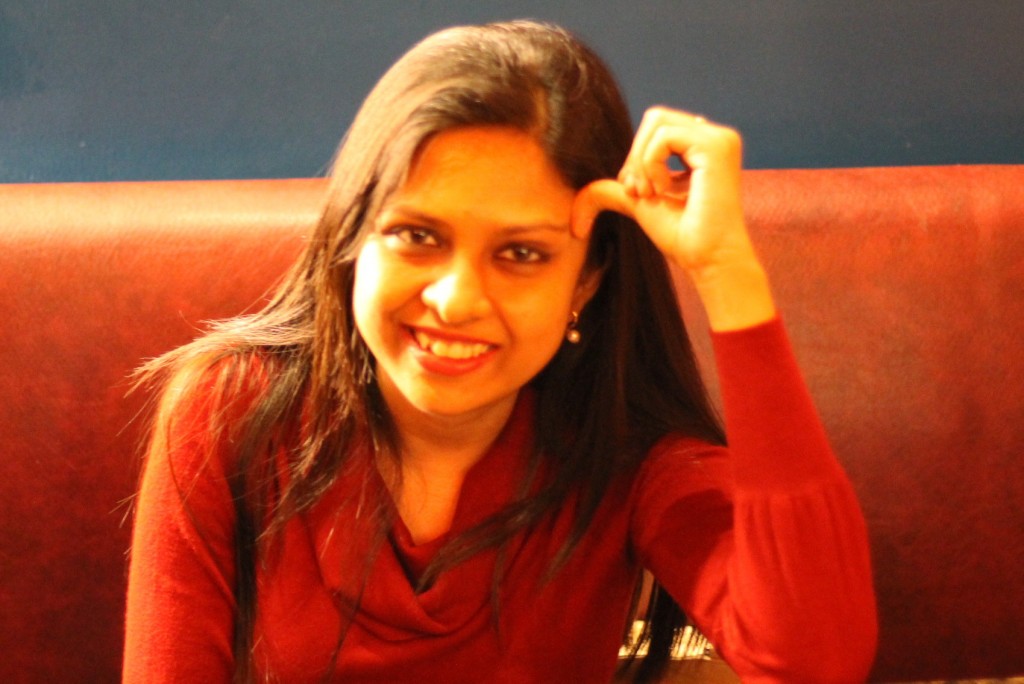 I was not aware of the marketing scenario- it has been my Project Manager, Uzair Thakur, who has educated me on the different marketing strategies of the novel. I am still learning.
I was not aware of the marketing scenario- it has been my Project Manager, Uzair Thakur, who has educated me on the different marketing strategies of the novel. I am still learning.
Besides the Crosswords, Starmarks and Oxford –where the novel’s hard copies are available, I must say that the power of the online media is profound.
I am quite lucky to belong to this generation where I have Facebook and Twitter and various online tools to market the novel.
As an advice to new authors who market their novel- I would say that demand for honest reviews, that will only improve your craft and enhance the subsequent sales. Marketing can be exhaustive and results take time to manifest. So, be patient.
The subject of your book is unconventional yet pertinent in contemporary India. What triggered the idea of writing a book on this subject?
When I went to work in the UK for a year, I found all my fellow Indians discussing how things back home are:
– why they don’t want to go back home to work,
-why most of them plan to enroll their kids into foreign colleges, and not in Indian colleges.
-why they always litter the Indian streets and never the foreign streets,
-why they abide by all the rules outside India and do not feel obliged to do so in the country
-why they move out of India and that India should change and someone should bring forth into notice that such changes are necessary….
All these discussions made me feel that I am doing nothing to be a part of the change.
Few of the issues like cleanliness and following the rules; they can be done by every citizen.
If we educated people do not follow these, then why blame the uneducated ones?
Each citizen represents the microcosm of our country.
While discussing the impacts of student political activities, agitations and mass movements, especially in colleges of Bengal, all of us felt that such political activities should diminish in colleges, which are primarily meant for education.
An average Bengali is much more talented than an average person from a developed country.
Yet, Bengal is lagging behind in development.
Why?
That was my deciding point to write the novel.
Can you tell us about your writing process and habits?
It took me 4 years to write the novel and a full year for editing and proof read.
I mainly wrote from 10 pm to 2 am, that is the prime time when my imagination is at zenith and pen flows the smoothest.
First, I created a matrix for the primary, secondary and tertiary characters and the plots. Dialogue creating was the later stage and description came in the last stage.
We have seen a number of political movements in the Indian campuses in the recent times. Public opinion has been divided upon issues and protests have reached National scale. How do you think student politics affects the country at large and your opinion on politics in college campuses?
As I have mentioned in the novel, an educational institute need must give prime importance to education. Political activities can be secondary and non mandatory.
I see student politics having negative impact on the education system in the current time. The students are impressionable as well as easy to mold. It is necessary to spend the formative years of youth in gaining knowledge, which will hold a long stead in employment and future prospects.
Can you summarize your thoughts on Ragging and College Campus politics?
I was told in college that ragging teaches to respect seniors, networking and self- confidence.
But I have never seen ragging to shape the above objectives- rather ragging engenders fear of superiors, networking only with selfish motives and loss of confidence.
There are better methods to teach respect, interaction and confidence.
To improve the education system, which in turn profoundly impacts the employment sector, it is necessary that education be given value over politics.
Not many meritorious teachers want to go and teach in public schools in suburbs. Also, there has been a continuous lack of teachers compared to the huge amount of students. Does this teacher student ratio have a long -drawn impact? If so, how?
Yes.
Most meritorious teachers want to teach and connect with students. They do not wish to be involved in active politics.
Presently, public schools and colleges- fraught with political activities, does not give enough impetus to the meritorious teachers to teach there. Hence, they look for other institutes or abroad for job opportunities.
Students are at the losing end because due to lack of good teachers, appreciation of subjects is impossible. It is a teacher who draws one to the subject and is the connecting link between the student and the literary pursuit and its continuance.
Back to your book, do you connect real life experiences with those you have penned? Or maybe the other way round, things you have penned, came true?
My novel is fiction.
However, many incidents actually have a hint of reality.
When I began writing 5 years ago, I never thought that the context of the novel would become so relevant.
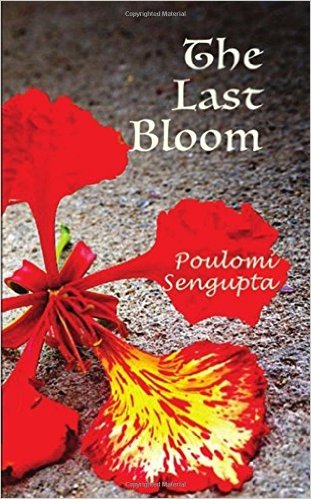 Where do you see publishing going in the future?
Where do you see publishing going in the future?
Though the advent of online media has made Ebook quite popular, we cannot disparage the value of hard copy.
I still find book lovers preferring a hard copy over the soft one.
The feel of the book is different that of the online version.
Hence, publishing industry will continue to thrive as long as bibliophiles rein the world J
What advice would you give to aspiring writers?
Be original!
Be appreciative towards positive and negative feedback.
Let each comment and suggestion inspire you to write better.
We would like to know what is in your radar for the next adventure?
While writing ‘The Last Bloom’, I had a trilogy in mind.
I had planned the present novel on the politicization of higher education of the country.
The plot of the second one is based on the employment and conditions of private and public sector workers in India and why people prefer to work abroad.
The third one is based on the transition of thought process about romance from the past to the present generation.
All above are in the form of one centralized theme of a love story.
Do you have any parting words for readers?
Thank you for reading my novel J Your comments and feedback have been inspiration to me.
That was Poulomi Sengupta for you! Team Spectralhues wishes her very best for her future endeavours.
Tags: author interview Poulomi Sengupta Poulomi Sengupta interiview spectralhues The Last Bloom
